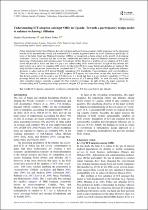| dc.contributor.author | Kyakulumbye, Stephen | |
| dc.contributor.author | Pather, Shaun | |
| dc.date.accessioned | 2023-03-10T09:41:19Z | |
| dc.date.available | 2023-03-10T09:41:19Z | |
| dc.date.issued | 2022 | |
| dc.identifier.citation | Kyakulumbye, S., & Pather, S. (2022). Understanding ICT adoption amongst smes in Uganda: Towards a participatory design model to enhance technology diffusion. African Journal of Science, Technology, Innovation and Development, 14 (1) , pp.49-60. https://doi.org/10.1080/20421338.2020.1802843 | en_US |
| dc.identifier.issn | 2042-1346 | |
| dc.identifier.uri | https://doi.org/10.1080/20421338.2020.1802843 | |
| dc.identifier.uri | http://hdl.handle.net/10566/8573 | |
| dc.description.abstract | Policy statements by the United Nations, the African Union and most African countries boldly pronounce on the anticipatedbenefits of the internetworked world and associated ICT to society in general and to the world of business specifically. Interms of the latter, Small and Medium Enterprises (SMEs) are recognized as being critical to the growth of developingeconomies. There is consensus that this sector has considerable potential for improved business outcomes through theharnessing of Information and Communication Technologies (ICTs). However, a problem of low adoption of ICT in thissector still prevails in Africa and there is a gap in our understanding of the reasons for this. In light of this problem, thispaper reports on a survey of Ugandan SME owners in which their ICT pre-usage beliefs and attitudes are explored. Thestudy identified four pre-use factors that are correlated with ICT use. The pre-usage beliefs which significantly influencedecisions to adopt and use ICT include Benefit expectation, ICT learnability, User-confidence, and User-friendliness.These are found to be key determinants of ICT adoption. ICT support and ease-of-use on the other hand were factorsthat did not correlate with decisions to use ICT. However, it is found that there is a low predictive capability (17.7%) ofpre-usage beliefs and attitudes in respect of prior use or non-use of ICT among SMEs. As such, this study found thatother contextual factors constitute a greater (82.3%) predictive percentage. In light of this, the paper concludes byrecommending an ICT participatory design process to mitigate ICT pre-use scepticism among SMEs owners. | en_US |
| dc.language.iso | en | en_US |
| dc.publisher | Taylor and Francis Group | en_US |
| dc.subject | African Union | en_US |
| dc.subject | Uganda | en_US |
| dc.subject | Information and Communication Technologies (ICTs) | en_US |
| dc.subject | Entrepreneurship | en_US |
| dc.subject | Economic | en_US |
| dc.title | Understanding ICT adoption amongst smes in Uganda: Towards a participatory design model to enhance technology diffusion | en_US |
| dc.type | Article | en_US |

